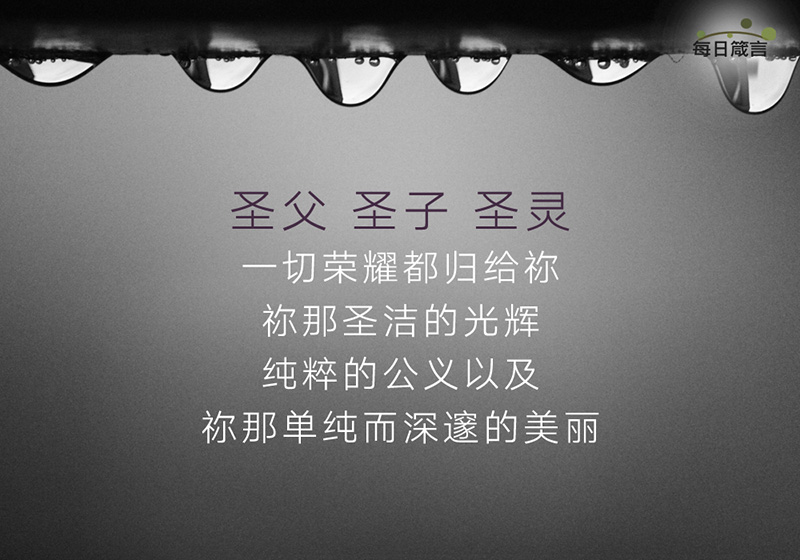

作家安妮·拉姆特说到,她大多数的祷告都能以这样交替的祷告来总结:“帮助我,帮助我,帮助我”和“感谢祢,感谢祢,感谢祢”。或许对我们大部分人来说,这也是真实的。当然,我们也会承认我们的罪说:“对不起,对不起,对不起”。但我们都意识到,我们总是把我们的需要带到神的面前,然后以感恩的祈祷结束这个循环——这乃是合宜的回应。
感恩是美好而且必要的。颂赞理应也是如此;但是,我们并不常如此行。颂赞是因着神的所是而赞美祂,是把神光芒万丈的圣洁所当得的荣耀归给祂。藉着感恩 ,我们为着我们所领受的献上感谢;而藉着颂赞,我们尊崇神的所是。我们高举和颂赞主,单单因为祂是神。
颂赞一词来自希腊文,字面的意思是“荣耀的话语”。我们看见神的荣耀,因而当我们把这些荣耀归神的时候,我们就是在诉说令人惊奇的话语。
在保罗的新约书信中,他常常向神发出颂赞,经常是在书信的结尾,就如我们在腓立比书第4章所看到的。各种各样的颂赞也应该常常从我们的心里和嘴唇上流露出来。
荣耀的神配得我们把一切的荣耀都归给祂!
圣父、圣子、圣灵,一切荣耀都归给祢:祢那圣洁的光辉,纯粹的公义以及祢那单纯而深邃的美丽。阿们。

腓立比书 4:20
20 愿荣耀归给我们的父神,直到永永远远!阿们。
"To our God and Father be glory for ever and ever. Amen." — Philippians 4:20
The writer Anne Lamott claims that a great deal of her prayer life can be summarized by the alternating prayers “Help me, help me, help me” and “Thank you, thank you, thank you.” Probably this is true of most of us. And, of course, we also need to say “Sorry, sorry, sorry” in confessing our sins. But we all recognize that we are forever bringing God our needs and then—in appropriate response—closing the loop with a prayer of gratitude.
Thanksgiving is wonderful and necessary. But so is doxology—and it’s not always clear that we do much of this. Doxology is praising God for who he is. It is giving God the glory that is due him for his radiant holiness. In thanksgiving we offer up gratitude for something we have received. But in doxology we honor the very being of God. We exalt and praise the Lord simply because he is God.
The word doxology comes from Greek and literally means “glory word.” We see God’s glory, and we speak a word of amazement as we send that glory to God.
Doxologies erupted from Paul quite often in his New Testament letters—and usually near the end, as we find here in Philippians 4. Doxologies of many kinds should regularly flow from our hearts and lips too!
Our glorious God is worthy of all the glory we can beam back to him!
All glory be to you, Father, Son, and Holy Spirit, for the radiance of your holiness, the purity of your righteousness, the beauty that is simply and profoundly YOU! Amen.
诵读: 楚云
片头: 张妙阳

